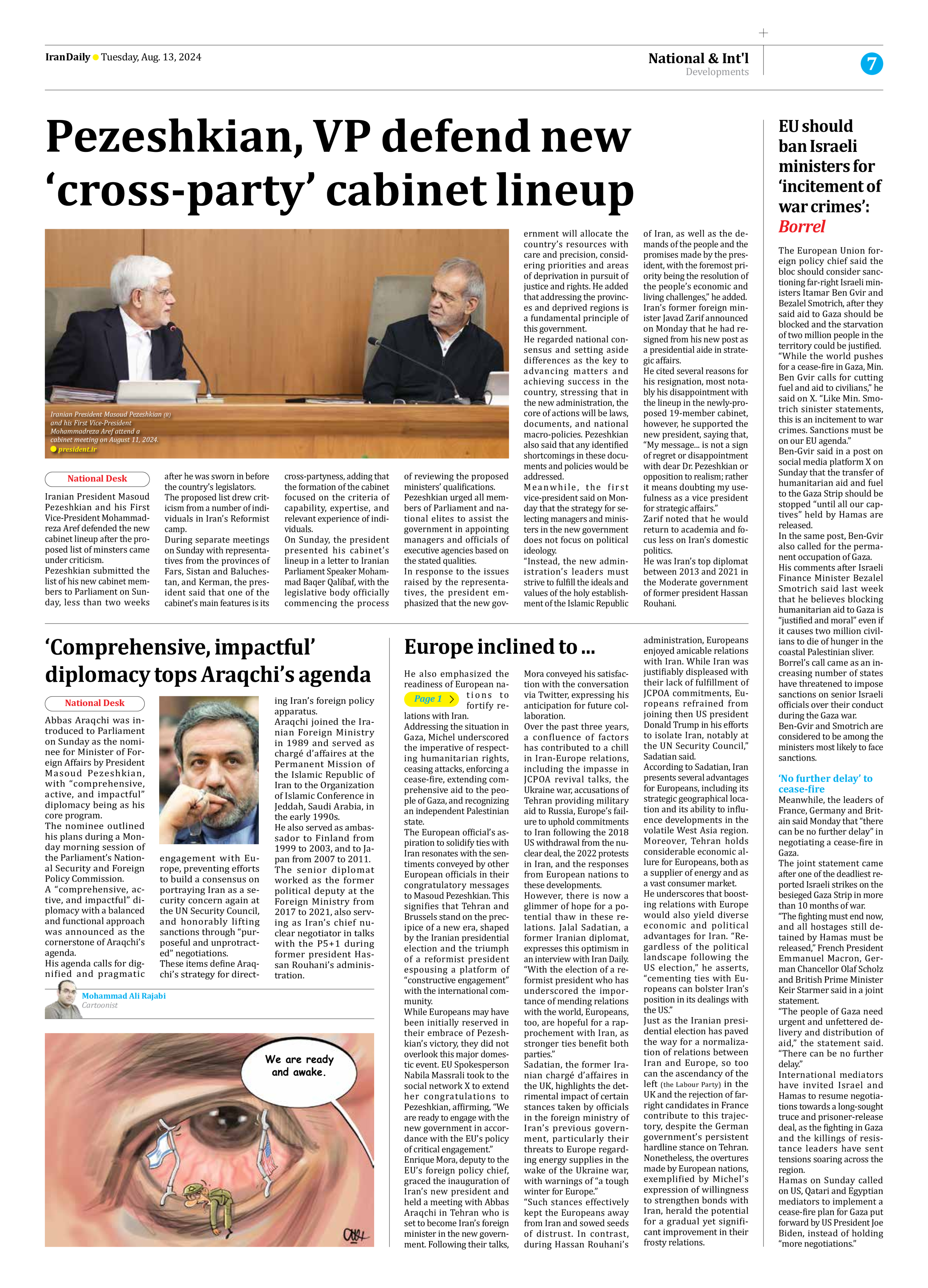
Europe inclined to ...
Page 1
He also emphasized the readiness of European nations to fortify relations with Iran.
Addressing the situation in Gaza, Michel underscored the imperative of respecting humanitarian rights, ceasing attacks, enforcing a cease-fire, extending comprehensive aid to the people of Gaza, and recognizing an independent Palestinian state.
The European official’s aspiration to solidify ties with Iran resonates with the sentiments conveyed by other European officials in their congratulatory messages to Masoud Pezeshkian. This signifies that Tehran and Brussels stand on the precipice of a new era, shaped by the Iranian presidential election and the triumph of a reformist president espousing a platform of “constructive engagement” with the international community.
While Europeans may have been initially reserved in their embrace of Pezeshkian’s victory, they did not overlook this major domestic event. EU Spokesperson Nabila Massrali took to the social network X to extend her congratulations to Pezeshkian, affirming, “We are ready to engage with the new government in accordance with the EU’s policy of critical engagement.”
Enrique Mora, deputy to the EU’s foreign policy chief, graced the inauguration of Iran’s new president and held a meeting with Abbas Araqchi in Tehran who is set to become Iran’s foreign minister in the new government. Following their talks, Mora conveyed his satisfaction with the conversation via Twitter, expressing his anticipation for future collaboration.
Over the past three years, a confluence of factors has contributed to a chill in Iran-Europe relations, including the impasse in JCPOA revival talks, the Ukraine war, accusations of Tehran providing military aid to Russia, Europe’s failure to uphold commitments to Iran following the 2018 US withdrawal from the nuclear deal, the 2022 protests in Iran, and the responses from European nations to these developments.
However, there is now a glimmer of hope for a potential thaw in these relations. Jalal Sadatian, a former Iranian diplomat, expresses this optimism in an interview with Iran Daily.
“With the election of a reformist president who has underscored the importance of mending relations with the world, Europeans, too, are hopeful for a rapprochement with Iran, as stronger ties benefit both parties.”
Sadatian, the former Iranian chargé d’affaires in the UK, highlights the detrimental impact of certain stances taken by officials in the foreign ministry of Iran’s previous government, particularly their threats to Europe regarding energy supplies in the wake of the Ukraine war, with warnings of “a tough winter for Europe.”
“Such stances effectively kept the Europeans away from Iran and sowed seeds of distrust. In contrast, during Hassan Rouhani’s administration, Europeans enjoyed amicable relations with Iran. While Iran was justifiably displeased with their lack of fulfillment of JCPOA commitments, Europeans refrained from joining then US president Donald Trump in his efforts to isolate Iran, notably at the UN Security Council,” Sadatian said.
According to Sadatian, Iran presents several advantages for Europeans, including its strategic geographical location and its ability to influence developments in the volatile West Asia region. Moreover, Tehran holds considerable economic allure for Europeans, both as a supplier of energy and as a vast consumer market.
He underscores that boosting relations with Europe would also yield diverse economic and political advantages for Iran. “Regardless of the political landscape following the US election,” he asserts, “cementing ties with Europeans can bolster Iran’s position in its dealings with the US.”
Just as the Iranian presidential election has paved the way for a normalization of relations between Iran and Europe, so too can the ascendancy of the left (the Labour Party) in the UK and the rejection of far-right candidates in France contribute to this trajectory, despite the German government’s persistent hardline stance on Tehran. Nonetheless, the overtures made by European nations, exemplified by Michel’s expression of willingness to strengthen bonds with Iran, herald the potential for a gradual yet significant improvement in their frosty relations.







